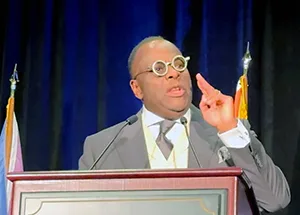WASHINGTON (RNS)—The Conference of National Black Churches has called on African American congregations to embrace a list of priorities—from “government-sponsored reparations” to improved access to health care—as they move out of a pandemic era and into an election year.
“We believe Black life must be valued and the humanity of all descendants of African descent must be affirmed,” said the conference’s board in a statement approved Dec. 12.
The listed priorities also call for a constitutional amendment to protect and guarantee the right to vote and for community policing policies that will prevent “stop and frisk” activities.
Approval of the statement highlighted the opening day of the organization’s national consultation, titled “Coming Out of Darkness, Finding Light: The Black Church Responding to the Continuing Pain of the Pandemic.”
“The Conference of National Black Churches presents ‘Ten Black Faith and Justice Ideals’ for uniting and mobilizing to push for reparative justice, freedom, global healing, empowerment and flourishing,” the statement said.
The consultation, held in Orlando, Fla., included speeches from Mandy Cohen, director for the Centers for Disease Control and Prevention, and Brandi Waters, senior director of African American studies in the College Board’s Advanced Placement Program. About 300 people attended.
The Conference of National Black Churches is a coalition of leaders of historically Black denominations, including the African Methodist Episcopal Church, African Methodist Episcopal Zion Church, Christian Methodist Episcopal Church, Church of God in Christ, Progressive National Baptist Convention and National Baptist Convention, USA.

“The Black Church, and this entire nation, find themselves still at a pivotal crossroads as it relates to our future,” said CNBC Chair W. Franklyn Richardson. “There are so many pressing issues, from the future of COVID-19 and mental health to gun violence and voting rights, that must be addressed.
“The CNBC board of directors entered this consultation committed to adopt a common set of principles that provide practical steps for our congregations to act on social justice issues from a civic and personal standpoint.
Sign up for our weekly edition and get all our headlines in your inbox on Thursdays
“We are showing that the Black church stands as a single unit against threats to our health, our vote, or our future.”
In a keynote speech at a consultation dinner, Al Sharpton, president of the National Action Network, announced a new joint get-out-the-vote initiative with the CNBC that will start training clergy and other organizers early next year.
Other specific concerns among the CNBC principles included economic equity, Black maternal health, a criminal justice system “driven by restoration rather than retribution,” and equitable funding for public schools and historically Black colleges and universities.
The CDC has partnered with the CNBC to address vaccine hesitancy in the Black community and to increase vaccination access, with some denominational leaders appearing in public service announcements to dispel misinformation.
Cohen, who became the new CDC director in July, thanked the Black church leaders for developing more than 600 vaccine sites at churches and helping get more than 1 million vaccines administered.
Cohen told consultation attendees she learned firsthand when she was North Carolina’s top health official that faith leaders thought the initial response to African American communities at the start of the COVID-19 pandemic was insufficient. She said lessons from that time, when the state started to work to enhance equitable vaccinations in communities of color, will guide her in her new role.
“Truly improving and protecting health requires connection and collaboration—across public health, health care, social services, education, religion, business and others,” she said in her speech. “This work to protect health can only be accomplished if we do it as a team.”
During her remarks, Waters described the revised framework of the Advanced Placement course on African American studies that has been offered as a pilot program in hundreds of schools prior to its official launch in the 2024-25 academic year.
She noted students learn about the Black church and Black faith traditions, including the Christian history of Africans prior to the transatlantic slave trade; gospel music; and newspapers published by denominations.
“We know that Black churches have been foundational for our communities in terms of building leadership, giving us a chance to express ourselves, political organizing, and also sustaining our spirits,” Waters told consultation attendees. “So this comes up in every unit of the course.”




